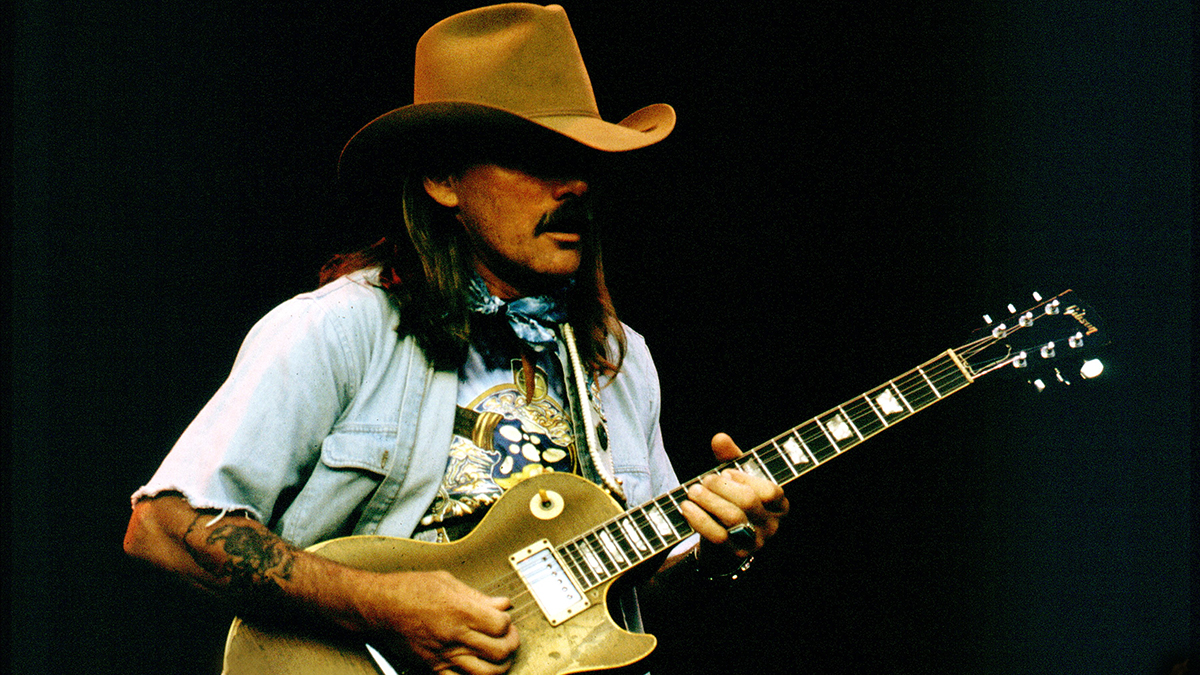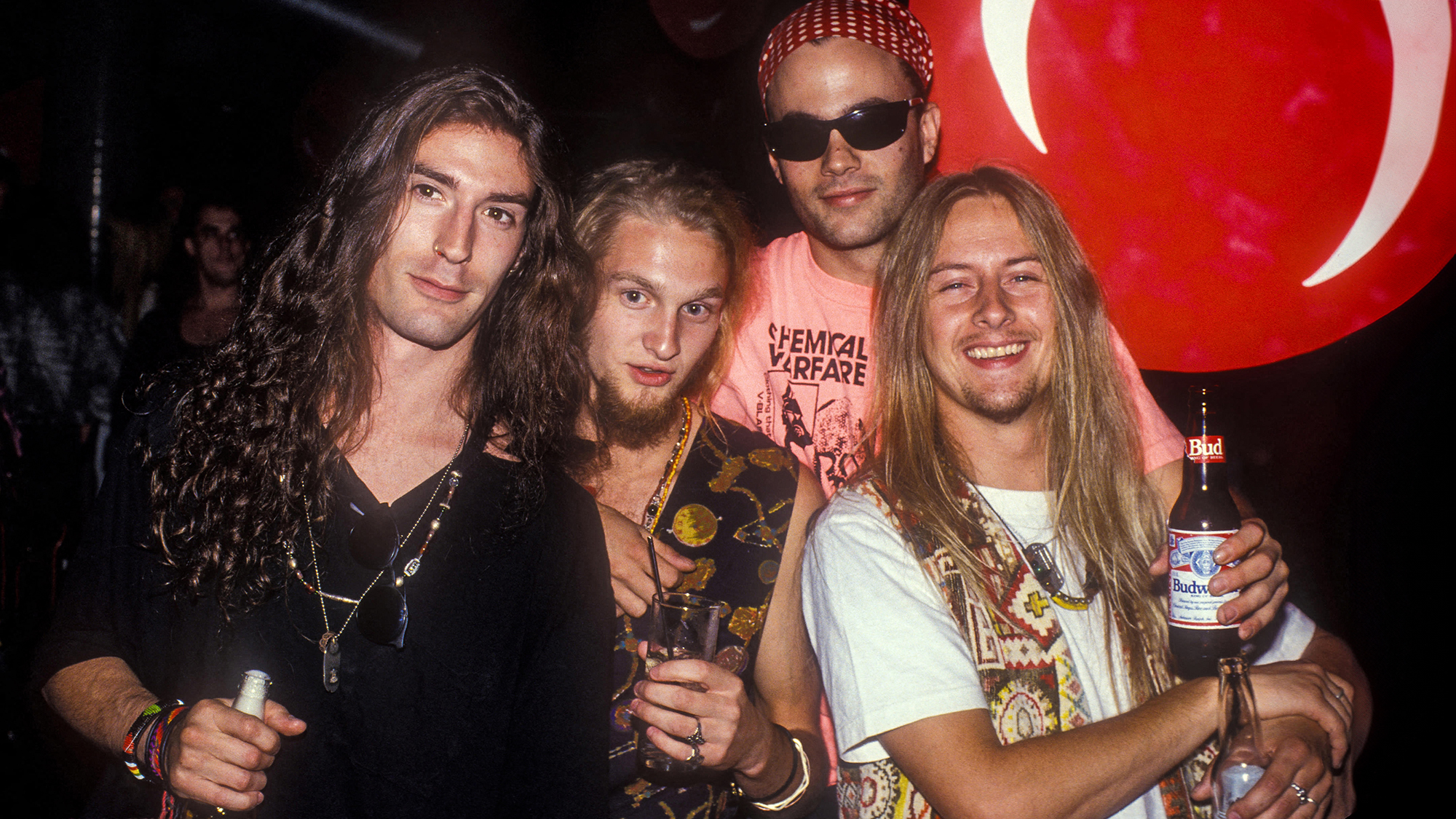“Sometimes things like that just come together, like a piece of magic. I wrote that song in just five minutes”: Dickey Betts on dueling with Duane Allman, composing Allman Brothers' biggest hit, and the oddball Les Paul/SG hybrid he “personally designed”
In 2019, the late Dickey Betts sat down with Guitar Player to reflect on the Allman Brothers and his musical career, from his early influences to his last solo live album

In honor of Dickey Betts, who died at the age of 80 on April 18 2024, we have been leafing through the Guitar Player archives to unearth some of his best interviews. The following is an interview that took place in 2019.
“I’ve definitely lived a dangerous life,” admits guitar legend Dickey Betts, “but not really that much different than a lot of other rock and rollers.”
Case in point: Of the six original members of the legendary Allman Brothers Band, only Betts and former drummer Jaimoe Johanson are still around to tell the tale. Guitarist Duane Allman was killed in a motorcycle accident in 1971, at just 24 years of age. Bass player Berry Oakley suffered the same fate a year later, close to the same location. Drummer Butch Trucks shot himself in 2017 and Gregg Allman, the band’s charismatic singer and keyboardist, succumbed to liver cancer after decades of hard living, just four months after Trucks’ passing.
Last year, Betts suffered a stroke, only to find himself hospitalized again a month later following a serious home accident. Just prior to those two incidents, on July 21, 2018, he’d recorded a live show at the St. George Theatre in Staten Island, New York City.
The concert featured Betts backed by bandmates bass player Pedro Arevalo, keyboardist Mike Kach and, in a nod to the Allman Brothers, two drummers – Steve Camilleri and Frankie Lombardi – plus slide guitarist Damon Fowler and Betts’ son, Duane.
Even Gregg Allman’s son Devon made an emotional guest appearance, performing one of his father’s signature compositions, “Midnight Rider”. One year later, the performance is now available on DVD as Ramblin’ Man: Live at the St. George Theatre (BMG), with abbreviated audio versions available on CD and vinyl.
Betts, who is still recovering, took some time to speak about the new release and his past with the Allman Brothers Band.
All the latest guitar news, interviews, lessons, reviews, deals and more, direct to your inbox!
How are you feeling?
“Well, I’m still a little shook up from the accident. I was trying give my dog, who’s a big Lab, a bath, when she suddenly charged me. While I was holding on to her, she rammed me right into these brick steps, which cracked the vertebrae in my neck and cracked my head open.
“I had to have brain surgery to stop the bleeding, and it was quite an ordeal. I was in a coma for about six days. I’m fully recovered now, but I’ve gained a lot of weight from just laying around, and my chops, of course, are real awkward. Hopefully, I’ll be doing some dates next summer.”
For years, you’ve been known for your iconic ’57 Les Paul Goldtop. The new live album shows you using an unusual SG-style Gibson model that you’ve been spotted with before, with a pickup selector on the upper bout and an asymmetric shape.
“The guitar is one that I personally designed for Gibson. It’s a cross between an SG and a Les Paul, and the controls are more user friendly than on an SG. It’s also got a shorter neck, more like a Les Paul. At first glance it looks like an SG, but when you really look, it’s totally different. That night I was also using Marshall amps with Electro-Voice speakers.”
Your son, Duane, has been playing with you for a long time, going back to your days with your band Great Southern. When you’re both playing Allman Brothers’ songs, is the dynamic similar to when you played with Duane Allman?
“Nobody plays like Duane Allman. He was a real individualist and had a very unique style. As far as slide playing goes, I’d say Derek Trucks plays slide like Duane Allman more than anybody.”
Your playing is a mix of country, blues, rock and even jazz. What were your primary guitar influences?
“Well, my dad played fiddle and my uncles played both fiddles and guitars, and we would have jam sessions at the house. That influenced my playing quite a bit. Plus, my mom always had the radio tuned to the country music stations, so that influenced me.”
Could you pick up WSM and The Grand Ole Opry?
“Yeah, we would all gather around the radio every Saturday night. Later on, there was this Texas station we could get, and they had Wolfman Jack, who played James Brown and all those rhythm-and-blues kinds of things.”
At what age did you start playing the guitar seriously?
“Probably what would be considered late by most musicians - around 16. I studied Chuck Berry, B.B. King, Albert King. I also hung around this western-swing guitar player that was so, so good. He’s the one who influenced me, and that’s how I really learned to play.”
Would you also count Bob Wills as an influence?
“I didn’t listen to Bob Wills that much, but I loved his band and their twin guitars. That’s how I was first exposed to twin-guitar harmony. I don’t read music, so I just listen to people and learn things from them.”
There’s a brand-new four-CD box set of the Allman Brothers Band from the 1971 Fillmore West shows [Fillmore West 1971]. Did you see any difference between that audience and the one at the East Coast Fillmore dates?
“There was definitely a noticeable difference between those two cities, San Francisco and New York. The West Coast audiences were looser, more like a having fun kind of audience. Maybe it was the LSD that was going around. In New York, they were pretty rowdy. Not in a mean way, just a “raise hell” kind of rowdy.”
It’s said that, unlike some live albums, where parts were recut in the studio, At Fillmore East is presented intact.
“That’s exactly right. The vocals, the guitar solos...everything. It is truly a live album. We did some editing, and [producer] Tom Dowd took out the horns. [At Dowd’s request, saxophonist Rudolph “Juicy” Carter and another unknown horn player were cut from the lineup during the first show because their horns were leaking into the other instruments’ mics].
“My new live album is kind of reminiscent of the Fillmore album – not comparing it to the sound, of course, but the cover has that same dark look.”
A photo inside At the Fillmore shows you playing a Les Paul. Did you use any other guitars at those dates?
“I think a [Gibson ES-] 335 and SGs, on and off. I can’t remember exactly. And I might have used a wah pedal on some songs.”
After Duane died, you had the added responsibility of not only playing your guitar parts but also having to replicate his slide playing.
“You know, to this day, I’m not crazy about playing electric slide because of that. I did play some slide before Duane and I started working together but didn’t play very well. But after he got killed, I had to take over. Songs like “Statesboro Blues” and some of the others would have sounded silly without it.”
Did his death put pressure on you to assume a leadership role in the band?
“I actually never wanted to be the leader, and neither did Duane. We were a pretty loose outfit, and didn’t have a real regimented hierarchy kind of thing. If one guy had a grudge or a problem with the rest of the guys, we’d get together and talk about it. That’s how we kept things together.”
Your influences range from country and rock to jazz. When I hear the melody to “In Memory of Elizabeth Reed,” it strikes me as having a strong jazz influence. Was it inspired at all by Miles Davis?
“I’d say part of it could have come from listening to Miles Davis. We used to listen to guys like Rahsaan Roland Kirk, Pharoah Sanders and Charlie Parker. So yeah, I see the Miles Davis connection.”
When you were planning on recording your first vocal for “Blue Sky,” did you feel confident about yourself as a singer, or were you considering letting Gregg do it?
“I never liked to sing that much. I mean, I do nowadays, but back then I always thought the main reason I was doing some singing onstage was to give Gregg a rest. So I didn’t start singing because of “Blue Sky.” It was just the first song that people noticed because it was the first time I did it on a record.”
What’s the story behind “Ramblin’ Man”?
“Actually, it was the Hank Williams song with the same title that I had in mind. Of course, his was a real mournful song, done in a minor key. I had a friend who was an old cowboy, and when he’d see me, he’d say, “Whatcha been doing? Playing your music and doing the best you can?”
“It just struck me as funny, so I just put those two lines together and started writing the song. Sometimes things like that just come together, like on a whim or like a piece of magic, and it all falls into place. I wrote that song on paper in just five minutes, like I was writing a letter to my girlfriend.”
After your association with the Allman Brothers ended in 2000, was there ever any thought of a reconciliation?
“I said, 'Let’s get back together and do a farewell tour,' but Butch didn’t want to do it. I’m still really sorry they ended things the way they did. I’m very proud though that the Allman Brothers music still stands on its own, and there’s a new generation with my son, Duane, Gregg’s son Devon and Berry Oaklely’s son keeping it alive. I’m just going to try to stay out of harm’s way and hope to be around for at least a few more years.”




